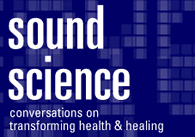News Release: Research, Winship Cancer Institute
Feb. 26, 2009
Emory Sound Science Podcast: Coping with Cancer's Emotional Fallout
 Listen to Dr. Michael Burke, featured on Sound Science.
Listen to Dr. Michael Burke, featured on Sound Science.It's estimated that 11 million Americans have cancer. All suffer the physical manifestations of the disease, as well as the emotional ones. Yet, only relatively recently have physicians recognized that easing the disease's emotional burden may improve patients’ treatment and prognosis.
Michael Burke, MD, clinical director of psychiatric oncology at Emory University Winship Cancer Institute, and his colleagues offer a collaborative approach toward therapies for the emotional, psychological and physical symptoms associated with cancer and its treatment. Burke has conducted studies focused on the effects of the disease’s emotional burden on patients and families and whether easing that burden can improve patients’ treatment and coping skills.
To listen to Burke's own words about the emotional effects of cancer, access Emory's new Sound Science podcast at http://whsc.emory.edu/soundscience/.
To help patients cope with a diagnosis of cancer, Burke and his colleagues evaluate patients' medical and personal history, environment and health behaviors, such as whether they’re getting enough exercise or increasingly using alcohol and tobacco. "I start by looking at the interaction between their health behaviors, their present emotional state, their past emotional state, the stage of their disease, and the milieu of their disease. We’re helping the person feel better beyond the cancer itself," says Burke.
Knowing how to help people feel better emotionally and physically, says Burke, depends greatly on what stage of the disease they are in. "If I have someone in the early stages, we just try to get them through the shock and get them through the difficulty and get them functioning. If someone is in the middle stage, we often look at how to deal with sustained stress and endure a difficult situation for a long period of time," says Burke.
Burke says patients have a wide range of reactions when told they have cancer. "After that initial shock, some people are desperate to get information, then there’s another set of folks who just go into shock, go into shut down. We need to understand that a person has the cancer, and we’re not just fixing the organ and making it better"
Burke received his MD degree from the Medical College of Georgia. He completed his residency and a clinical research fellowship at Duke University Medical Center.
###
The Robert W. Woodruff Health Sciences Center of Emory University is an academic health science and service center focused on missions of teaching, research, health care and public service. Its components include schools of medicine, nursing, and public health; Yerkes National Primate Research Center; the Emory Winship Cancer Institute; and Emory Healthcare, the largest, most comprehensive health system in Georgia. The Woodruff Health Sciences Center has a $2.3 billion budget, 17,000 employees, 2,300 full-time and 1,900 affiliated faculty, 4,300 students and trainees, and a $4.9 billion economic impact on metro Atlanta.
Learn more about Emory’s health sciences:
Blog: http://emoryhealthblog.com
Twitter: @emoryhealthsci
Web: http://emoryhealthsciences.org
